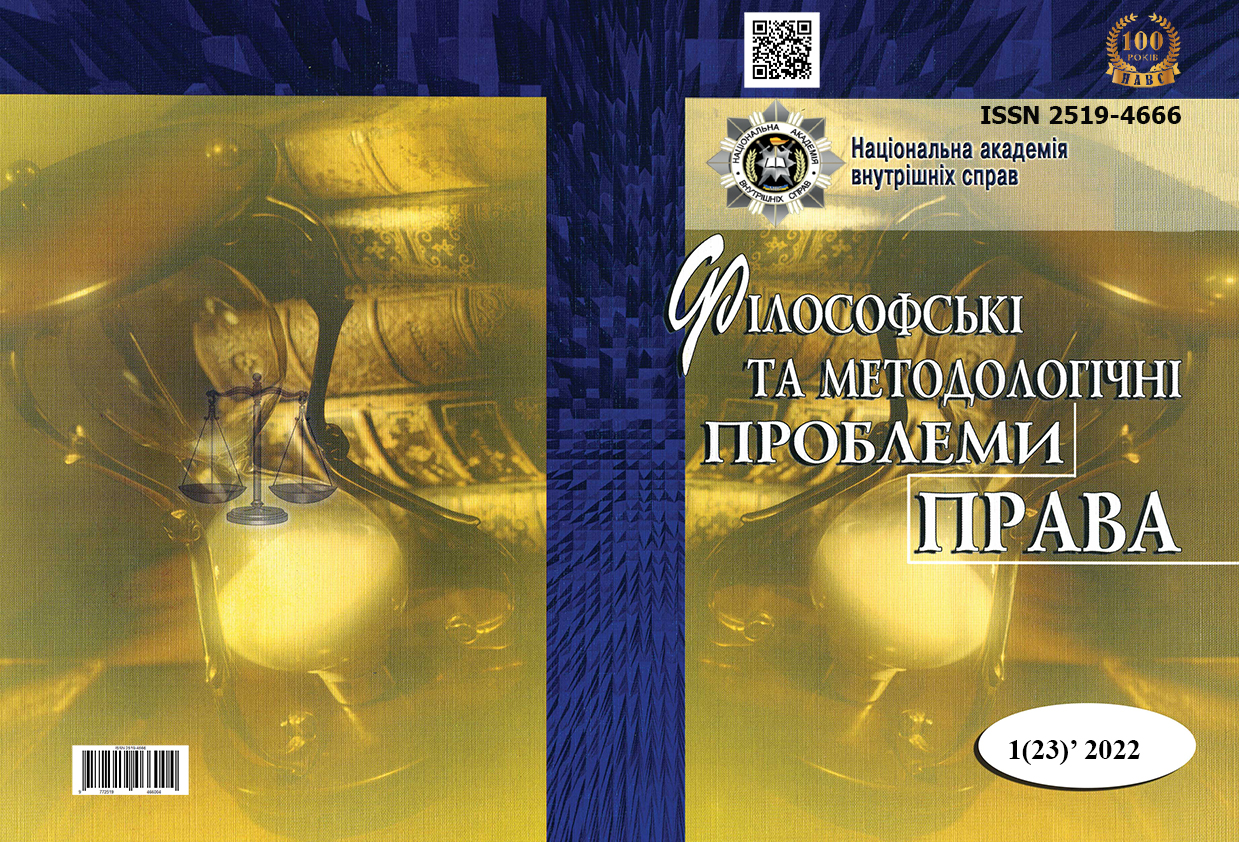Logical Foundations of Investigative Experiment Arrangement
Abstract
Topicality. As one of the most important means of establishing objective truth, the investigative experiment has always been the focus of scientific research. At the same time, not only legal, but also methodological, technological, psychological and other aspects of its organization have been studied for a long time. However, as evidenced by the analysis of scientific research in this field, there are many gaps in the study of the logical bases of the rationalization of investigative experimental actions. Thus, the aim of the article consists in general formulation of such bases for an investigative experiment arrangement, outlining the criteria for proving its results, as well as the algorithm for the systematic use of logical means of optimizing its implementation. Methodology. The method of comparative analysis is used for the exposure of sources of basic contradictions, traced in the most widespread methodological approaches to decision of the examined problem in modern literature. Based on the method of semantic analysis, the conditions of effectiveness of various logical and methodological tools in the field of investigative activities are determined. The methods of logical modeling, generalization and formalization are used in determining the logical principles of the investigative experiment organization and the algorithm of its rational arrangement. Scientific novelty. The article formulates the logical foundations of rational organization of the investigative experiment and the criteria for proving its results. The basic principles of systematized application of logical means of optimization of investigative experimental activity are offered. The results obtained. The algorithm of using logical means of organizing investigative actions should provide a rational combination of deductive and probabilistic-analytical approaches, maximizing the constructive potential and compensating for the limitations of each of them. In particular, regarding the organization of the investigative experiment, this algorithm involves structuring the mentioned organization by distinguishing three main stages: preparatory, approbative and confirmative, for each of which determines the relevant and most effective combination of logical and forensic research methods. Practical significance. The proposed methodological approach opens wide opportunities in terms of providing the essential objectivization, efficiency and reliability of investigative experimental strategies and methods.
Keywords: investigative experiment; logical modeling; arrangement of investigation; logic of investigation; criteria of provability.
Downloads
References
Гусєва В. Характеристика окремих видів слідчого експерименту під час розслідування кримінальних правопорушень. Судова та слідча практика в Україні. 2019. № 8. С. 52–56. DOI: http://10.32999/ksu2663-2713/2019-8-9.
Vecellio M., Hooper S. Laser Visualization of Bullet Paths. Journal of Forensic, Legal and Investigative Sciences, 2020. Vol. 6. DOI: http://dx.doi.org/10.24966/FLIS-733X/100049.
Klymchuk M., Marko S., Priakhin Ye., Stetsyk B., Khytra A. Evaluation of forensic computer and technical expertise in criminal proceedings. Amazonia Investiga. 2021. Vol. 10 (38). P. 204-211 (Web of Science).
Borysenko I., Bululukov O., Baranchuk V., Prykhodko V. The modern development of new promising fields in forensic examination. Journal of Forensic Science and Medicine. 2021. Vol. 7. P. 137-144 (Scopus).
Hryhorenko A., Musiienko O., Boyko-Dzhumelia V., Sakovskyi A., Myrovska A. Reconstruction as a method of crime investigation. Amazonia Investiga. 2021. Vol. 10. No. 45. P. 113–119. DOI: https://dialnet.unirioja.es/servlet/articulo?codigo=8336867 (Web of Science).
Townsley M., Birks D. Building better crime simulations: systematic replication and the introduction of incremental complexity. Journal of Experimental Cryminology. 2008. Vol. 4. P. 309–333. DOI: https://link.springer.com/article/10.1007/s11292-008-9054-4 (Scopus).
Sumbarova M. Aspects of Tactics of Investigative Experiment in Criminal Procedure of Latvia. Socrates. 2015. Vol. 2. No. 2. P. 84–91. DOI: https://doi.org/10.25143/SOCR.02.2015.2 (Scopus).
Evett I. The logical foundations of forensic science: towards reliable knowledge. Philosophical Transactions of the Royal Society. 2015. Vol. 370. P. 1–10. DOI: http://dx.doi.org/10.1098/rstb.2014.0263.
Гвоздік О. Логічні засоби оптимізації слідчої діяльності. Філософські та методологічні проблеми права. 2020. № 1. С. 109–117. DOI: https://doi.org/10.33270/0220190.
Girod R. Logical Investigative Methods: Critical Thinking and Reasoning for Successful Investigations. 2015. N.Y.: CRC Press. P. 270. DOI: https://doi.org/10.1111/lsi.12319.
Petherick W. Logic and Reasoning in Crime Analysis. Applied Crime Analysis. 2015. N.Y. P. 14–38. DOI: https://doi.org/10.1016/B978-0-323-29460-7.00002-8.
Тягло А. О стандартах доказательства. Форум права. 2018. № 1. С. 88–94. DOI: http://doi.org/10.5281/zenodo.1239007.
Pardo M. The paradoxes of legal proof: A critical guide. Boston University Law Review. 2019. Vol. 99. P. 233–290. DOI: https://ssrn.com/abstract=3293023.
Гвоздік О. Критерії достатності доказів. Філософські та методологічні проблеми права. 2019. № 2. С. 63–70. DOI: https://doi.org/10.33270/02191802.63.
Ramos D., Gonzalez-Rodriguez J., Zadora G., Aitken C. Information-theoretical assessment of the performance of likelihood ratio computation methods. Forensic Science. 2013. Vol. 58. P. 1503–1518. DOI: https://doi.org/10.1111/1556-4029.12233.
Overill R., Collie J. Quantitative evaluation of the results of digital forensic investigations: a review of progress. Forensic Science Research. 2021. Vol. 6. No 1. P. 13–18. DOI: https://doi.org/10.1080/20961790.2020.1837429.
Негребецький В. Відеозапис під час слідчого експерименту. Підприємництво, господарство і право. 2021. № 4. С. 257–261. DOI: https://doi.org/10.32849/2663-5313/2021.4.40.
Abstract views: 290 PDF Downloads: 194
Copyright (c) 2022 Philosophical and Methodological Problems of Law

This work is licensed under a Creative Commons Attribution-NonCommercial-NoDerivatives 4.0 International License.
- Authors reserve the right to authorship of their own work and transfer to the magazine the right of the first publication of this work under the terms of the Creative Commons Attribution License, which allows other persons to freely distribute published work with mandatory reference to authors of the original work and the first publication of an article in this magazine.
- Authors have the right to enter into separate additional agreements on non-exclusive dissemination of the work in the form in which it was published in the journal (for example, to post an article in the institution's repository or to publish as part of a monograph), provided that the link to the first publication of the work in this journal is maintained.
- The journal's policy allows and encourages the posting of articles by authors on the Internet (for example, in electronic storehouses of institutions or on personal websites), both before the submission of this manuscript to the editorial office and during its editorial processing, as this contributes to the creation of a productive scientific discussion and positively affects the efficiency and dynamics of citing the published work.




